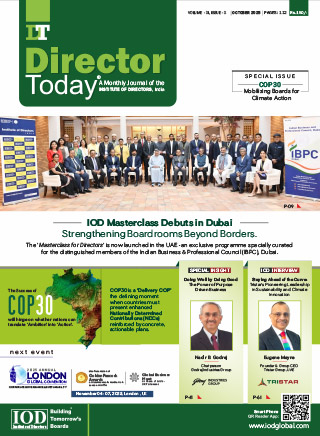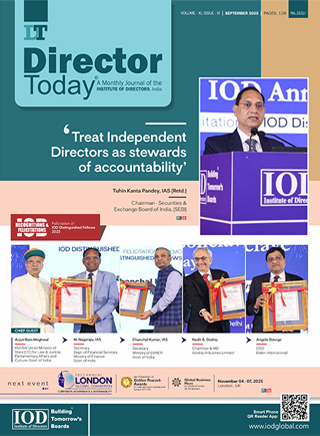A Webinar Report on AI and Cybersecurity in Boardrooms

The Institute of Directors (IOD), India, organised the Third Global Webinar of the Boardroom Webinar Series 2024-25. The theme was ‘AI and Cybersecurity in Boardrooms’, and was held on December 12, 2024. It was attended by around 200 participants, comprising Independent Directors, AI experts, aspiring and serving Board members, directors, policy-makers, educationalists, and private as well as public sector institutions.
The 'Introductory Remarks' were was offered by:
Mr. Manoj K. Raut
CEO & Secretary General
Institute of Directors, India
Mr. Raut set the stage for a discussion on the growing global conversation around AI its possibilities, challenges, and uncertainties. He highlighted the power struggle among business leaders striving to become frontrunners in AI, emphasizing the need for AI to be a force for good. The key question for leaders was how AI can drive critical business outcomes, while also ensuring that AI knowledge is democratized through emotional learning and practical case studies. Drawing a parallel between air and AI, he stressed the importance of AI-driven strategies for business growth, while also underlining the need to safeguard organizations against the everevolving landscape of cyber threats.
The 'Special Address' was delivered by:
Ms. Rama Vedashree
Former CEO
Data Security Council of India
Gurgaon, India
Ms. Vedashree spoke about the increasing adoption of frontier technologies across industries, emphasizing the pivotal role of AI and associated generative technologies in shaping the future. She highlighted the growing maturity in cybersecurity among large enterprises driven by regulatory demands and consumer expectations, contrasting it with the underinvestment in cyber resilience among small and medium-sized organizations (MSMEs) in sectors like healthcare and education. This disparity, she warned, creates a "cyber haves and have-nots" scenario, exacerbated by vulnerabilities within interconnected ecosystems, such as third-party vendors and supply chains. Stressing that AI is foundational to modern cybersecurity solutions, Ms. Vedashree underscored the need to integrate cybersecurity into enterprise governance, risk assessment, and mitigation strategies, making it a central and continuous focus for Chief Risk Officers and business leaders alike.

Following this, a POLL consisting of one question was conducted to gather participants' views on key issues. It received an overwhelmingly active response, demonstrating the participants' keen interest and willingness to contribute. This engagement enriched the discussions with diverse perspectives and valuable insights.
The poll data highlights key challenges for boards in addressing AI and cybersecurity risks. The most significant concern is the lack of expertise at the board level (48%), underscoring the need for directors to deepen their understanding of technology.
Inadequate risk assessment frameworks (25%) and budget/resource constraints (8%) indicate gaps in risk management and funding. The rapidly evolving regulatory landscape and low prioritization (both at 10%) suggest a lack of urgency in addressing these issues. These findings emphasize the need for closer collaboration between boards and IT experts to effectively tackle these challenges.

PANEL SESSION
The Future of Boardrooms: Embedding AI & Cybersecurity into Organisational DNA
The Session was moderated by:
Mr. Srihari Murthy
CEO & Founder
Factri.Ai
Bengaluru, India
The distinguished speakers of the Panel were:
1. Mr. Chris Burt
Principal - Halex Consulting Limited
London, UK
2. Ms. Krystyna Jarek
Founder - Booster of Innovation
Warsaw, Poland
3. Mr. Nimitt Jhaveri
Managing Partner - BitScore Cybertech LLP
Mumbai, India
4. Ms. Sashiprabha Dharmadasa
Director - Client Services & Technical Delivery/CISO
BoardPAC
Sri Lanka
Mr. Murthy spoke about the staggering global impact of cybercrime, estimated to cost $0.5 trillion annually surpassing the combined profitability of illegal drug trade and ranking as the world's third largest economy if measured as a nation. Highlighting the dual role of AI as both a safeguard and enabler of sophisticated cyberattacks, he emphasized the unprecedented stakes for boardrooms in navigating this landscape. Drawing parallels between the rapid progression of industrial revolutions and the current AIdriven Industry 4.0, he underlined the accelerating pace of transformation, urging companies to embrace change as a necessity for resilience. Citing futurist Roy Amara, Mr. Murthy stressed the importance of balancing short-term AI hype with a long-term vision, advocating for ethical, technical, and regulatory frameworks to manage AI's profound and unpredictable impact on industries, societies, and cybersecurity.
Mr. Burt spoke on the theme, 'Cybersecurity in the Age of AI: Threats, Trends, and Trust'. He discussed the dual nature of AI in cybersecurity, emphasizing the need to shift discussions from fear and uncertainty to a more balanced understanding of its potential. He highlighted AI's defining characteristics of adaptivity and autonomy, which make it both transformative and challenging to govern, especially for boards reliant on AI systems. The fear of missing out (FOMO) among stakeholders has further pressured organizations to embrace AI, despite concerns about accountability and understanding its outcomes. Mr. Burt pointed out the agility advantage of cybercriminals, who can experiment and adapt rapidly compared to organizations bound by regulatory and operational constraints. He also referenced regulatory developments like the EU's AI Act, urging boards to establish a clear risk strategy and explore AI's potential through controlled initiatives like centers of excellence or incubators. This approach, he stressed, allows organizations to innovate responsibly while addressing the evolving cybersecurity landscape.

Ms. Jarek spoke on the theme, 'GenAI's Influence on Productivity: Transforming Work and Enhancing Value'. She discussed four key areas shaping the impact of AI on the workforce: the evolving workplace scenario, the transformative experiences of employees, creative symbiosis with AI, and the post-generative AI future. She emphasized the importance of training employees to collaborate effectively with AI, noting that proper education significantly boosts productivity. She also highlighted challenges such as resistance to AI onboarding and its potential to affect employee attitudes and task prioritization. Despite these challenges, she lauded AI's ability to amplify human creativity and innovation. She outlined strategies for leveraging AI to disrupt industries and underscored the need for leaders to focus on AI as an augmentation tool rather than merely an automation solution. Concluding with a call for leadership readiness, she stressed the importance of managing talent and fostering creativity in an AI-driven era.
Mr. Jhaveri spoke on the theme, 'Securing the Future: AI and Cybersecurity for Resilient Enterprises'. He discussed the dual role of AI in cybersecurity, noting that while cybercriminals have been quick to leverage AI for sophisticated attacks impacting individuals, companies, and supply chains, organizations are increasingly adopting AI for cyber defense. He highlighted the benefits of AI in enabling faster detection, response, and recovery, reducing revenue loss and business disruption, although smaller companies face challenges in implementation due to limited resources. He also addressed issues like data quality, algorithmic bias, and a talent shortage in professionals skilled in both AI and cybersecurity. Emphasizing the importance of continuous cyber performance management, he recommended evaluating security measures across internal systems and third-party dependencies while fostering organization-wide training and awareness. In conclusion, he underscored AI's transformative potential in enhancing cybersecurity resilience and urged organizations to adopt proactive strategies to navigate this evolving landscape.
Ms. Dharmadasa spoke on the theme, 'Cybersecurity Governance in Financial Institutions'. She highlighted the critical role of cybersecurity as both a technological necessity and a trust enabler for financial institutions, emphasizing that reputational damage from cyber incidents can threaten business sustainability. She outlined key considerations for combating evolving cyber threats, including navigating diverse regulatory landscapes, adapting to information sovereignty requirements, and ensuring supply chain security. Addressing challenges like resource limitations, data overload, and a shortage of AI-trained cybersecurity professionals, she stressed the importance of timely incident mitigation and maintaining accurate asset inventories. She also discussed India's initiatives in this domain, such as the proposed Digital India Act 2023, which aims to update regulations for cybercrime, data protection, and online safety, and the National Data Governance Framework Policy, designed to foster AI and data-driven innovation. These measures, she noted, are crucial as financial institutions embrace generative AI, cloud-based systems, and exponential data growth in shaping the future of banking.
The real, profound impact of AI often unfolds quietly over years or decades transforming industries, reshaping societies, and, in the case of cybersecurity, altering the very nature of how we secure systems, data, and people.’
The 'Special Keynote Address' was delivered by:
Ms. Renee Wynn
Independent Board Director
Former NASA CIO
Virginia, USA
Ms. Wynn spoke on the theme, ‘Integrating AI & Cybersecurity in Boardrooms: A Strategic Blueprint for Global Directors’ She emphasized the importance of addressing cyber risks in space, highlighting their impact on business operations and resilience. From a board perspective, she stressed that preparedness and response are essential for ensuring business continuity, particularly as cyber incidents occur in space daily. She pointed out the growing risks posed by the increasing presence of commercial satellites, which now outnumber those owned by nations, and the lack of geographic boundaries in space. This shift necessitates a reevaluation of peaceful operations frameworks. Additionally, she underscored the critical role of satellites in maintaining telecommunications and infrastructure during climate events, where terrestrial systems may fail. She concluded by linking cybersecurity, AI, quantum encryption, and emerging technologies to preparedness and resilience, urging businesses to understand and address the risks associated with their operations, including those tied to space.

The discussions were followed by an engaging Q&A session with participants. A list of the questions addressed during the webinar can be found elsewhere in this issue.
This was followed by the 'Vote of Thanks' and 'Special Motivation Talk', proposed by:
Mr. Doug Gordon
Professional Speaker, CEO Coach, Author, Corporate Trainer & TEDx Speaker
Ireland
Mr. Gordon concluded the session with a motivational talk, focusing on the importance of Mindset, Actions, Knowledge, and Energy (MAKE) in successfully implementing AI and cybersecurity within boards. He encouraged a growth mindset, emphasizing that AI should be viewed as a tool to enhance business operations rather than a risk. Mr. Gordon shared his experience with AI-powered tools, noting how they can significantly improve efficiency, and highlighted the importance of understanding AI and its applications through continuous learning and exposure to industry leaders. He also underscored the need for positive energy in communications, ensuring buy-in from teams and clients. Concluding with gratitude, he thanked the distinguished speakers, sponsors, and guests for their valuable contributions, and encouraged further engagement through LinkedIn for additional insights and connections. He also expressed his appreciation to the Institute Directors for organizing the event.
IOD is grateful to the partners of the Boardroom Webinar Series 2024-25:
Our Strategic Partner: Nasdaq
Our Institutional Partners:
1. Bitscore Cybertech LLP
2. BoardPac
3. Gujarat Fluorochemicals Limited
Our Knowledge Partners:
1. Halex Consulting
2. Taxmann
PARTNERS FOR BOARDROOM WEBINAR SERIES 2024

Author

Institute of Directors India
Bringing a Silent Revolution through the Boardroom
Institute of Directors (IOD) is an apex national association of Corporate Directors under the India's 'Societies Registration Act XXI of 1860'. Currently it is associated with over 31,000 senior executives from Govt, PSU and Private organizations of India and abroad.
Owned by: Institute of Directors, India
Disclaimer: The opinions expressed in the articles/ stories are the personal opinions of the author. IOD/ Editor is not responsible for the accuracy, completeness, suitability, or validity of any information in those articles. The information, facts or opinions expressed in the articles/ speeches do not reflect the views of IOD/ Editor and IOD/ Editor does not assume any responsibility or liability for the same.

 Quick Links
Quick Links
 Connect us
Connect us




 Back to Home
Back to Home






























